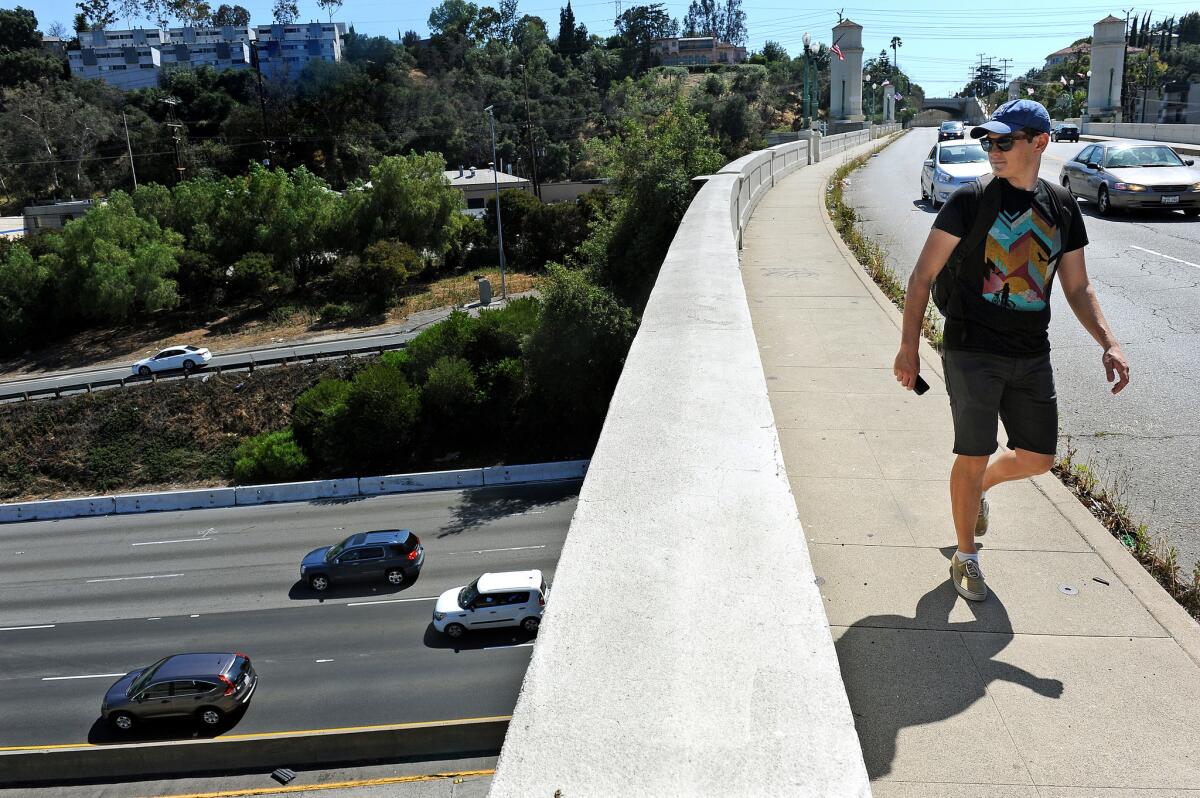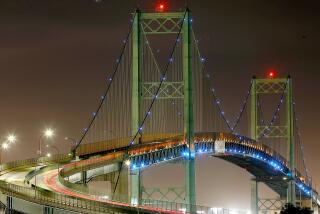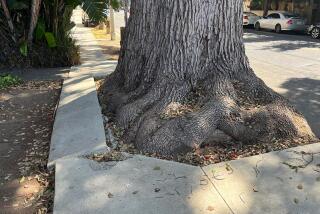L.A. OKs bridge plan opposed by bicyclists and pedestrian activists

Niall Huffman walks along the Glendale-Hyperion bridge on June 7 while participating in a rally to keep sidewalks on both sides of the bridge as it undergoes retrofitting.
Los Angeles lawmakers backed a hotly debated plan Tuesday to remake a historic bridge between Silver Lake and Atwater Village, overriding the objections of bicyclists, pedestrian activists and neighborhood groups pushing for sidewalks on both sides of the span.
The decision pitted those activists and residents against other groups and businesses loath to lose a car lane on the span over the L.A. River and Interstate 5. On a unanimous vote, the City Council pressed ahead with the plan despite opposition from newly elected councilman David Ryu, who will soon represent neighborhoods at the Silver Lake end of the bridge.
Longtime Councilman Tom LaBonge, who is being replaced by Ryu, said he was eager to pass the plan before his term ends this month. âI want to make sure that it gets done,â he said.
After the vote, activists opposed to the plan said they were weighing a lawsuit, possibly based on how the plan would affect Angelenos with disabilities.
The Glendale Boulevard-Hyperion Avenue bridge, built more than eight decades ago, is slated to undergo a $50-million makeover for seismic safety.
The historic bridge has narrow sidewalks that arenât compliant with the Americans With Disabilities Act. It also lacks bicycle lanes and is at risk of serious damage in an earthquake.
The question of how to retrofit the bridge became another battleground in the perennial L.A. war over the competing interests of drivers, cyclists and pedestrians.
Bicycle activists, pedestrian advocates and several neighborhood and community groups argued against the plan recommended by city engineers, which would provide a sidewalk only on the west side of the new bridge. Many said teens headed from the south end of Atwater Village to Marshall High on the opposite side of the bridge would be forced to walk farther in order to use a safe sidewalk, tempting them to walk in planned bike lanes or cut across traffic unsafely.
Some also argued that the plan failed to comply with federal law on access for the disabled. A technical report prepared by an engineering firm for the city found that a disabled person traveling to or from some of the southern parts of Atwater Village via the bridge would have to travel 1,550 feet farther because there was no sidewalk on the other side.
âItâs going to create barriers for students, people who are disabled and for everyone else trying to get across,â said Matthew Mooney, who represents the Silver Lake Neighborhood Council.
During the recent campaign for the council seat, Ryu and his opponent Carolyn Ramsay joined the Los Feliz Neighborhood Council and the Silver Lake Neighborhood Council in backing an alternative plan that would include sidewalks on both sides but only three lanes for vehicular traffic. That plan was also backed by an advisory committee formed by city officials.
But city staffers said they opted not to pursue that alternative plan because few people are crossing on foot. In a dozen hours, the city tallied up only 106 people walking across the bridge, most of them on the west side of the span. Los Feliz resident Sean Meredith argued it was unfair to judge the demand based on the current, âtotally unsafeâ conditions.
âI am shocked that children use it at all now,â Meredith said. âIf there were two safe sidewalks, it would change significantly.â
But other neighborhood groups, including the Atwater Village Neighborhood Council and the Los Feliz Improvement Assn., backed the city plan to retrofit the bridge with a single sidewalk.
Many were concerned that cutting the number of car lanes on the bridge would worsen traffic in the area. Some are already upset with backups created after the city reduced lanes on nearby Rowena Avenue. The Atwater Village Chamber of Commerce warned lawmakers that such a âroad dietâ would turn shoppers away from the area and cost small businesses. Others raised concerns about constricting a key route out of the city in the event of a disaster.
âRemoving one lane would greatly increase our gridlock and overflow into neighborhood streets,â said Don Seligman, treasurer of the Los Feliz Improvement Assn.
Councilman Mitch OâFarrell, who represents Atwater Village, said it was âcompletely unnecessaryâ to reduce the number of car lanes because the city was still providing an uninterrupted sidewalk for pedestrians. He added that a new pedestrian bridge was being created nearby.
âWe donât want to push for a road diet when one isnât needed,â OâFarrell said.
At a recent hearing, city officials warned that reducing the number of car lanes would require them to do more review of the bridge project under the California Environmental Quality Act, and that further delays could end up putting L.A. at risk of losing some federal funds for the project.
But critics of the city plan pointed out that a Caltrans official testified at a recent hearing that the city could seek extensions. (Caltrans is neutral on the plan, that official said.)
Mooney argued that the city should have put off the decision until Ryu took office. âIf this project goes through and God forbid something happens on that bridge, someone gets hurt, Ryu is the one thatâs going to have to deal with it,â Mooney said.
A council committee declined to weigh in on the decision last week, passing it along to the full council without a recommendation. After being urged to support the plan by LaBonge and OâFarrell, the council voted 11 to 0 Tuesday to back the contested design.
Follow @latimesemily for whatâs happening at Los Angeles City Hall
More to Read
Sign up for Essential California
The most important California stories and recommendations in your inbox every morning.
You may occasionally receive promotional content from the Los Angeles Times.











